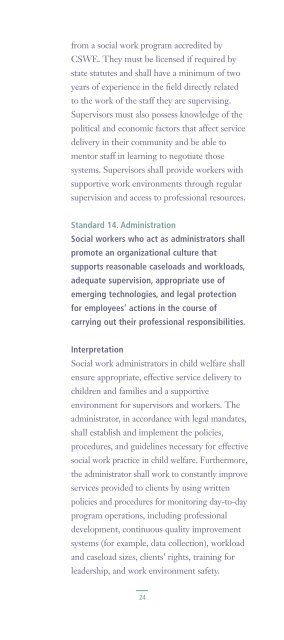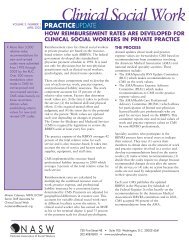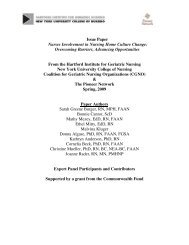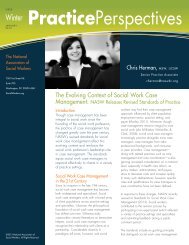Child Welfare - National Association of Social Workers
Child Welfare - National Association of Social Workers
Child Welfare - National Association of Social Workers
Create successful ePaper yourself
Turn your PDF publications into a flip-book with our unique Google optimized e-Paper software.
from a social work program accredited by<br />
CSWE. They must be licensed if required by<br />
state statutes and shall have a minimum <strong>of</strong> two<br />
years <strong>of</strong> experience in the field directly related<br />
to the work <strong>of</strong> the staff they are supervising.<br />
Supervisors must also possess knowledge <strong>of</strong> the<br />
political and economic factors that affect service<br />
delivery in their community and be able to<br />
mentor staff in learning to negotiate those<br />
systems. Supervisors shall provide workers with<br />
supportive work environments through regular<br />
supervision and access to pr<strong>of</strong>essional resources.<br />
Standard 14. Administration<br />
<strong>Social</strong> workers who act as administrators shall<br />
promote an organizational culture that<br />
supports reasonable caseloads and workloads,<br />
adequate supervision, appropriate use <strong>of</strong><br />
emerging technologies, and legal protection<br />
for employees’ actions in the course <strong>of</strong><br />
carrying out their pr<strong>of</strong>essional responsibilities.<br />
Interpretation<br />
<strong>Social</strong> work administrators in child welfare shall<br />
ensure appropriate, effective service delivery to<br />
children and families and a supportive<br />
environment for supervisors and workers. The<br />
administrator, in accordance with legal mandates,<br />
shall establish and implement the policies,<br />
procedures, and guidelines necessary for effective<br />
social work practice in child welfare. Furthermore,<br />
the administrator shall work to constantly improve<br />
services provided to clients by using written<br />
policies and procedures for monitoring day-to-day<br />
program operations, including pr<strong>of</strong>essional<br />
development, continuous quality improvement<br />
systems (for example, data collection), workload<br />
and caseload sizes, clients’ rights, training for<br />
leadership, and work environment safety.<br />
24

















